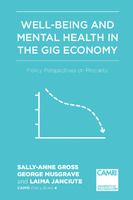Well-Being and Mental Health in the Gig Economy
Policy Perspectives on Precarity
Author(s)
Gross, Sally-Anne
Musgrave, George
Janciute, Laima
Language
EnglishAbstract
"A response is needed to the numerous issues spurred by the expansion of the gig economy, where flexible patterns of employment prevail in contrast to permanent jobs. In this context of the exponential growth of the digital economy and underlying business models the largest nationwide study of its kind into the impact of the working conditions in the UK music industry ‘Can Music Make You Sick?’ has been conducted by MusicTank/University of Westminster.
This research suggests the need to consider the future of work not only from an economic or employment law perspective but from a mental health one too. What are the psychological implications of precarious work and how are factors such as financial instability, the feedback economy and personal relationships reflected in mental health outcomes or connected to the business relationships most musicians and other gig economy participants work under?
Authors Sally-Anne Gross, George Musgrave and Laima Janciute consider which policy measures may help or harm gig economy workers including the taxation of self-employed workers, a universal basic income, education around mental health issues and access to mental health support."
Keywords
precarious work; mental health; self-employment; music industry; gig economy; policy; Basic income; Freelancer; Labour law; London; Temporary workDOI
10.16997/book32ISBN
9781911534891; 9781911534914; 9781911534921OCN
1076774361Publisher
University of Westminster PressPublisher website
https://www.uwestminsterpress.co.uk/Publication date and place
2018Series
CAMRI Policy Briefs, 5Classification
The arts: general topics
Sociology: work and labour
Psychology
Media, entertainment, information and communication industries
Medicine and Nursing


 Download
Download